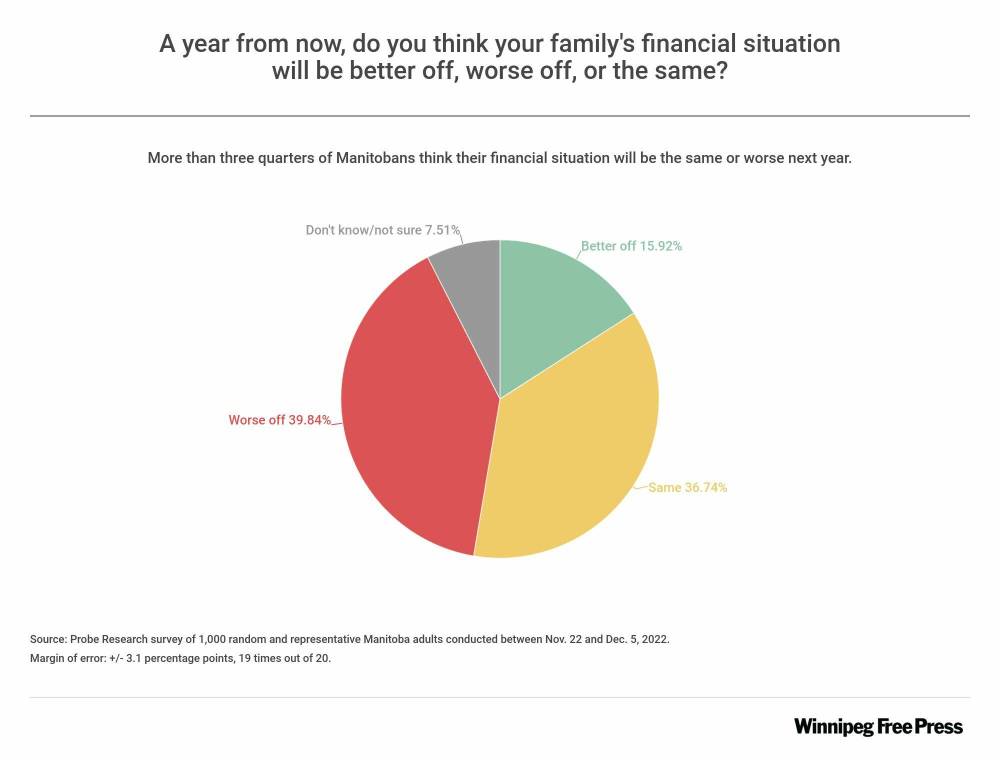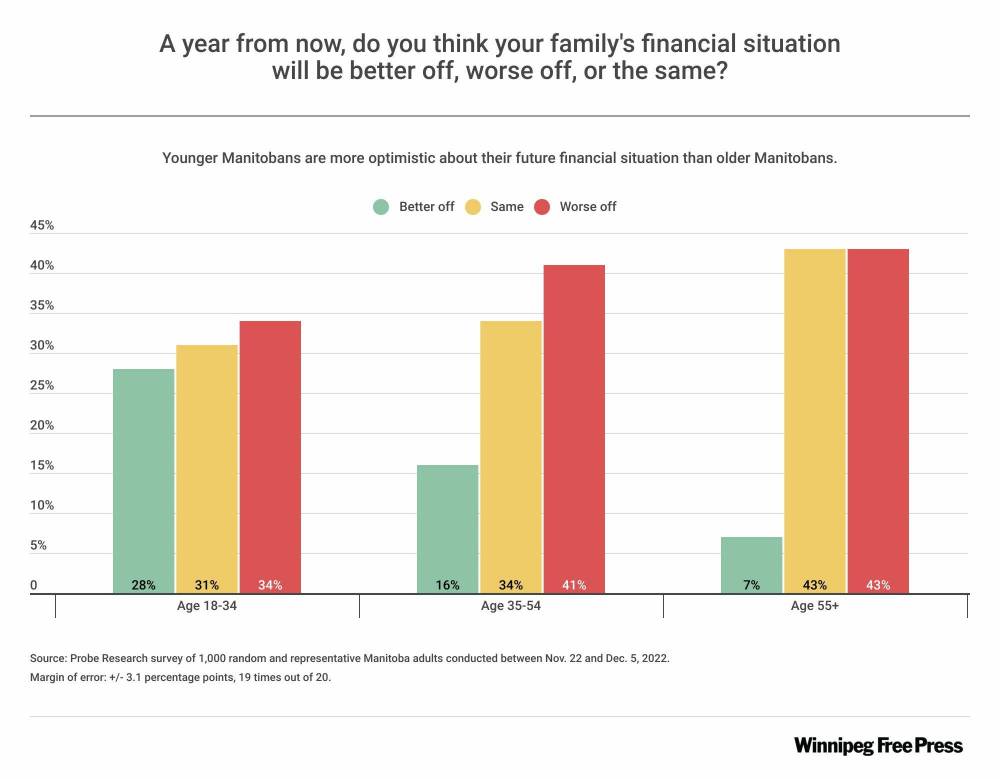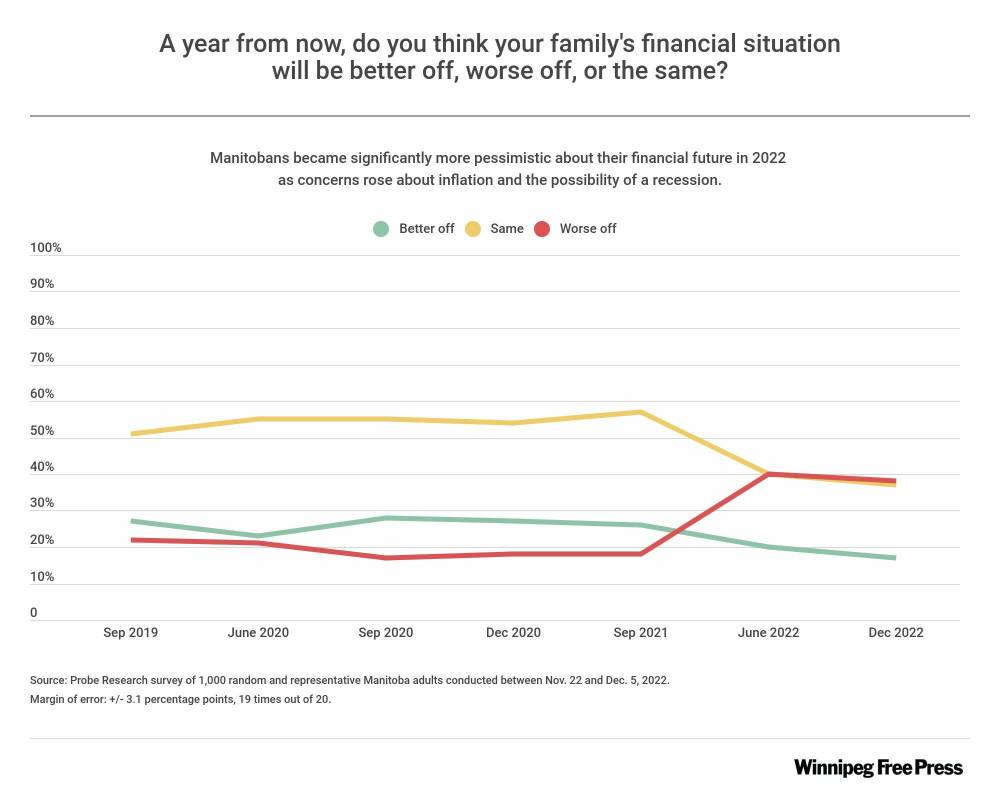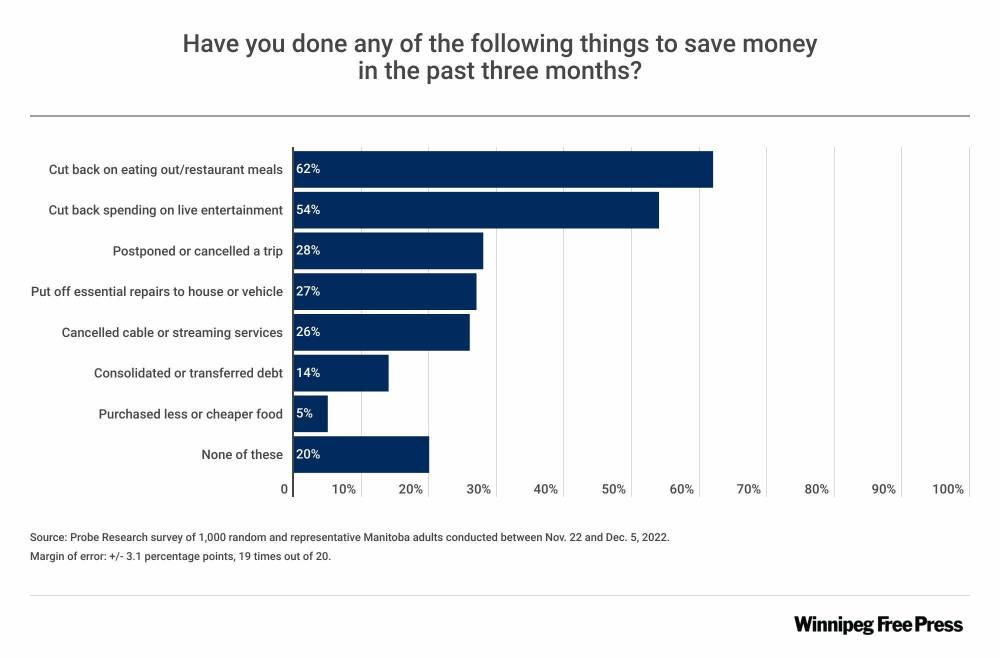…And an anxious new year: Manitobans’ financial fears jump in recent poll More than twice as many people in Winnipeg expect to be worse off in a year’s time, compared to number in November 2021 survey
Read this article for free:
or
Already have an account? Log in here »
To continue reading, please subscribe:
Monthly Digital Subscription
$0 for the first 4 weeks*
- Enjoy unlimited reading on winnipegfreepress.com
- Read the E-Edition, our digital replica newspaper
- Access News Break, our award-winning app
- Play interactive puzzles
*No charge for 4 weeks then price increases to the regular rate of $19.00 plus GST every four weeks. Offer available to new and qualified returning subscribers only. Cancel any time.
Monthly Digital Subscription
$4.75/week*
- Enjoy unlimited reading on winnipegfreepress.com
- Read the E-Edition, our digital replica newspaper
- Access News Break, our award-winning app
- Play interactive puzzles
*Billed as $19 plus GST every four weeks. Cancel any time.
To continue reading, please subscribe:
Add Free Press access to your Brandon Sun subscription for only an additional
$1 for the first 4 weeks*
*Your next subscription payment will increase by $1.00 and you will be charged $16.99 plus GST for four weeks. After four weeks, your payment will increase to $23.99 plus GST every four weeks.
Read unlimited articles for free today:
or
Already have an account? Log in here »
Hey there, time traveller!
This article was published 16/12/2022 (1086 days ago), so information in it may no longer be current.
Katherine Lind carries several things through the grocery store — her wallet, her soon-to-be purchases and a persistent, nagging feeling of uncertainty.
“COVID kind of made things uncertain about what you could count on,” said Lind, who runs a dance studio that closed and reopened during Winnipeg’s changing pandemic public-health restrictions.
“It’s just made a difference in the outlook. (I’m) waiting for something to happen.”
She has cut back on restaurant visits and discretionary spending because of the rising cost of living, and is worried about her financial future, she said.
And she’s not alone. Forty per cent of Manitobans expect to be financially worse off one year from now, a recent Probe Research poll commissioned by the Free Press reveals.
The number decreases slightly to 38 per cent in Winnipeg. In the fall of 2021, just 18 per cent of Winnipeggers expected to be financially worse off in a year’s time.
Those most likely to believe they will be worse off, according to the poll, have lower levels of education; 45 per cent of people with a high school diploma or less schooling were concerned about their finances.
Only 16 per cent of respondents said they’ll be in a better financial position next December. Those who were most optimistic were younger adults aged 18-34 (28 per cent compared to seven per cent among those older than 55) and men (19 per cent. vs. 13 per cent among women).
Kitty Bernes has noticed the change in attitude. She measures it by the span between customers’ appointments and the amount of time her salon chair is unoccupied.
“I’ve got a really strong clientele, but… I even get gaps in my day now,” said Bernes, the head stylist at Freshair Boutique on Academy Road.
RUTH BONNEVILLE / WINNIPEG FREE PRESS “I’ve got a really strong clientele, but… I even get gaps in my day now,” said Kitty Bernes, the head stylist at Freshair Boutique on Academy Road.
She’s been in the industry for more than 30 years. Clients who previously visited about every month are now booking once every 12 weeks, in some cases.
“A haircut and a hair colour are things that people can push back,” Bernes said. “Nobody’s making more money, but everything’s costing more money, so it’s hard.”
Each shampoo bottle or other hair-care product for sale is carefully considered — if it’s not popular, it doesn’t get shelf space, she said.
“We can’t actually afford to keep everything (we did pre-pandemic),” she said.
Product costs have jumped, along with seemingly everything else. Manitoba’s inflation rate was 8.4 per cent in October.
Near Freshair, Halle Price is waiting for customers she can help find holiday-party outfits.
“I know that the hype last year was ‘shop local,’ and we still had the community providing that,” said Price, Mad About Style Boutique’s assistant store director. “The vibe is different this year.”
Sales are subpar for the typically busy month, Price said.
“Getting out of the pandemic, we were really hoping for that lift again… and it just hasn’t really hit normal,” she said. “It definitely has been… a struggle.”
Shoppers might pick between two items, where in the past, they’d buy both, Price said.
“I think that part of the problem now is with inflation running so high, and with this possibility of a recession coming in 2023, people are sort of pessimistic about what they think is going to happen,” said Stefan Dodds, a University of Winnipeg economics professor.
“I know that the hype last year was ‘shop local,’ and we still had the community providing that. The vibe is different this year.”–Halle Price
Inflation rates have skyrocketed in 2022. Manitoba’s lowest year-over-year inflation rate was 5.5 per cent in January. The rate peaked in June, at 9.4 per cent, and has remained above eight per cent since.
The Bank of Canada has raised its key interest rate four percentage points since March in an attempt to cool demand and control inflation. Hiked interest rates affect people who are borrowing money, increasing the cost of monthly payments on major purchases, such as vehicles and mortgages.
Folks paying more on their loans are less likely to spend elsewhere, noted Jesse Hajer, a University of Manitoba economics professor.
“(Reduced spending) can have a negative ripple effect on the broader economy,” Hajer wrote in an email. “One person’s spending is someone else’s income.”
A slowing economy can lead to job losses, further reducing spending, Hajer wrote. So far, Manitoba’s unemployment rate is low — 4.4 per cent in November — and the province’s job count dropped 0.8 per cent the same month, following a 0.7 per cent increase in October.
“More precarious, lower-income workers are also often the first to lose their jobs in a recession,” Hajer wrote.
Dodds said a slowdown in growth or “possibly a recession” is possible in 2023.
“What might happen in the end to improve things is for us to go through a period where the economy does weaken a little bit, and then interest rates start to come down again,” Dodds said.
A higher cost of living hasn’t necessarily dampened business this month, said Chuck Davidson, president of the Manitoba Chambers of Commerce.
“We expect the holiday season to be good,” Davidson said. “We’ll see what it looks like in the new year.”
However, according to the Probe Research poll, four in five Manitobans have cut discretionary spending during the last three months.
“What we’re really encouraging Manitobans… when you do have that disposable cash, do what you can to support those local businesses,” Davidson said.
Labour challenges, inflation and supply-chain issues are among the problems “piling on” small businesses, he added.
Probe Research surveyed 1,000 Manitobans between Nov. 22 and Dec. 5. The organization touts 95 per cent certainty that the online poll’s results would be within plus or minus 3.1 percentage points if all Manitoba adults took the survey.
gabrielle.piche@winnipegfreepress.com

Gabby is a big fan of people, writing and learning. She graduated from Red River College’s Creative Communications program in the spring of 2020.
Our newsroom depends on a growing audience of readers to power our journalism. If you are not a paid reader, please consider becoming a subscriber.
Our newsroom depends on its audience of readers to power our journalism. Thank you for your support.












